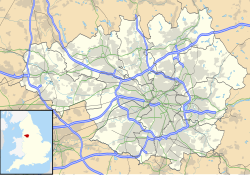St David's Church is in Copperas Lane, Haigh, Wigan, Greater Manchester, England. It is an active Anglican parish church in the deanery of Wigan, the archdeaconry of Warrington, and the diocese of Liverpool.[1] The church is recorded in the National Heritage List for England as a designated Grade II listed building.[2] It was a Commissioners' church, having received a grant towards its construction from the Church Building Commission.[3]
| St David's Church, Haigh | |
|---|---|
 St David's Church, Haigh, from the northeast | |
| 53°34′33″N 2°35′46″W / 53.5758°N 2.5961°W | |
| OS grid reference | SD 606,090 |
| Location | Copperas Lane, Haigh, Wigan, Greater Manchester |
| Country | England |
| Denomination | Anglican |
| Website | St David, Haigh & Aspull |
| History | |
| Status | Parish church |
| Dedication | Saint David |
| Architecture | |
| Functional status | Active |
| Heritage designation | Grade II |
| Designated | 22 February 1967 |
| Architect(s) | Thomas Rickman and Henry Hutchinson |
| Architectural type | Church |
| Style | Gothic Revival |
| Groundbreaking | 1830 |
| Completed | 1886 |
| Specifications | |
| Materials | Stone, slate roof |
| Administration | |
| Province | York |
| Diocese | Liverpool |
| Archdeaconry | Warrington |
| Deanery | Wigan |
| Parish | Wigan North East |
History edit
St David's was built between 1830 and 1833 to a design by Thomas Rickman and Henry Hutchinson.[4] A grant of £3,433 (equivalent to £350,000 in 2021)[5] was given towards its construction by the Church Building Commission.[3] The church was consecrated by the Rt Revd John Bird Sumner, bishop of Chester, on 2 November 1833. It was originally a chapel of ease to Wigan Parish Church, becoming a parish in its own right in 1838.[6] In 1886 the east end of the church was extended by J. Medland Taylor.[4]
Architecture edit
The church is constructed in stone. The roof is slated and has a ridge of red tiles.[2] Its architectural style is Gothic Revival.[3] The plan consists of a nine-bay nave with a west porch and a north projection, and a lower and narrower two-bay chancel with an organ chamber to the south. The porch is gabled with triple lancet windows and doorways on the north and south sides. Above the porch is a gabled bellcote. The east window has three lights.[2] Along the sides of the church are thin buttresses interspersed with tall lancet windows. Inside the church, the nave has a flat ceiling, and the chancel has a hammerbeam roof. At the west end is a stone gallery, with a baptistry under the south arch. The stained glass includes a window by Heaton, Butler and Bayne.[4]
External features edit
The lychgate at the entrance to the churchyard, and the adjoining churchyard wall, are listed at Grade II. The lychgate is in stone with a slate roof, and is dated 1909. There are gargoyles at the corners, and a cross on the ridge.[7] The churchyard contains the war graves of three service personnel of World War I, and seven of World War II.[8]
See also edit
References edit
- ^ St David, Haigh & Aspull, Church of England, retrieved 18 April 2012
- ^ a b c Historic England, "Church of St David, Haigh (1228229)", National Heritage List for England, retrieved 18 April 2012
- ^ a b c Port, M. H. (2006), 600 New Churches: The Church Building Commission 1818–1856 (2nd ed.), Reading: Spire Books, p. 335, ISBN 978-1-904965-08-4
- ^ a b c Pollard, Richard; Pevsner, Nikolaus (2006), Lancashire: Liverpool and the South-West, The Buildings of England, New Haven and London: Yale University Press, p. 183, ISBN 0-300-10910-5
- ^ UK Retail Price Index inflation figures are based on data from Clark, Gregory (2017), "The Annual RPI and Average Earnings for Britain, 1209 to Present (New Series)", MeasuringWorth, retrieved 11 June 2022
- ^ St David's C of E Church Haigh, Aspull Village, retrieved 18 April 2012
- ^ Historic England, "Lychgate to Church of St David and churchyard wall, Haigh (1228081)", National Heritage List for England, retrieved 18 April 2012
- ^ HAIGH (ST. DAVID) CHURCHYARD, Commonwealth War Graves Commission, retrieved 6 February 2013
